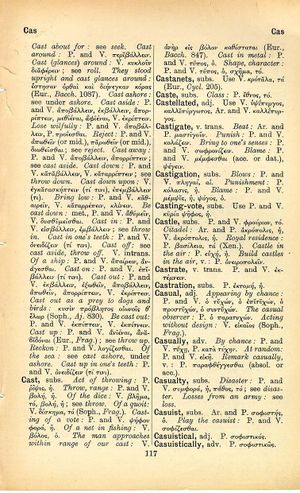castigate
Δυσαμένη δὲ κάρηνα βαθυκνήμιδος ἐρίπνης / Δελφικὸν ἄντρον ἔναιε φόβῳ λυσσώδεος Ἰνοῦς (Nonnus, Dionysiaca 9.273f.) → Having descended from the top of a deep-greaved cliff, she dwelt in a cave in Delphi, because of her fear of raving/raging Ino.
English > Greek (Woodhouse)
v. trans.
Beat: Ar. and P. μαστιγοῦν.
Punish: P. and V. κολάζειν.
Bring to one's senses: P. and V. σωφρονίζειν.
Blame: P. and V. μέμφεσθαι (acc. or dat.), ψέγειν.
Latin > English (Lewis & Short)
castīgātē: adv., v. castigo.
Latin > French (Gaffiot 2016)
castīgātē (castigatus),
1 avec réserve, retenue : Sen. Rhet. Contr. 6, 8
2 d’une manière concise : Macr. Scip. 1, 6 || -tius Amm. 22, 3, 12, avec plus de réserve.
Latin > German (Georges)
castīgātē, Adv. m. Compar. (castigatus, eingeschränkt), a) in Worten knapp gehalten, kurz, haec de monade castigatius quam se copia suggerebat, Macr. somm. Scip. 1, 6, 10. – b) eingeschränkt, eingezogen, castigate vivere, Sen. exc. contr. 6, 8. § 5: castigatius vivere, Amm. 22, 3, 12: castigatius (behutsamer) agere, Amm. 31, 14, 3.

